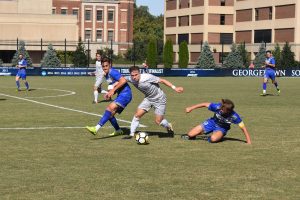This piece appears as part of our On The Pandemic column, featuring commentary about the COVID-19 pandemic from a diverse set of voices.
The coronavirus outbreak has brought about a total breakdown of life as we know it. In response to our new, demanding circumstances, new forms of classroom support have arrived in an effort to alleviate the challenges holding students back. But such empathy has not always been apparent at Georgetown, particularly when disabled students needed it.
Let’s skip back a few months, to my first class this semester. When class ended, I took a deep breath and approached my professor ready to give the usual explanation of my medical accommodations. As a sophomore who’s had to do this each semester, it’s become something of a script.
I showed her my insulin pump, explaining, “This is my insulin pump—it’s not a phone, and I just…thought you’d like to know.” For those in need of a translation, “I thought you’d like to know” is a polite way of saying, “Please don’t unintentionally scold me for using my medical device during class,” something that has happened rather frequently in the past.
Professors accept this clarification, but my other accommodations have often been met with more resistance. My diabetes can make me quite ill at times, making it hard to think or to even sit up. One of my accommodations provided by the Academic Resource Center (ARC) asks professors to allow me flexible attendance in such situations. Yet despite the fact that high or low blood sugar can completely incapacitate me, the arrangement specifies that professors may decide whether or not to allow me this accommodation. This means that even if my medical condition leaves me so sick that I physically cannot get to class, or even sit an exam, a professor can still decide it isn’t a valid absence and substantially lower my grade. Crucial decisions about my health are consequently left in the hands of my professors, even though few can even distinguish an insulin pump from a phone, much less understand the science behind my blood sugar levels.
Despite the apprehension and frustration this raises, I explain my need for flexible attendance and various other accommodations as a respectful request as opposed to the imperative that it really is. Unfortunately, professors disregarding ARC-provided accommodations isn’t an experience unique to me, but a common occurrence for disabled Georgetown students. I’m sure other disabled students will accordingly recognize this approach as a defense mechanism against the power professors hold over us. Although there are basic, minimal rules in place to support disabled students, these supports are invalidated when medically unqualified professors have the authority to reject them and make crucial decisions about students’ health.
This detrimental authority can manifest in a myriad of ways. A classroom isn’t wheelchair accessible. A professor neglects to provide texts in a font accessible to a student with impaired vision. A student with debilitating depression can’t even get out of bed, but their professor rejects their request for an extension on grounds of “laziness.” In such cases, professors are assigning individualized blame on students despite the fact that the real problem is systemic. Consequently, to minimize damage in an unfairly damaging system, students are forced to make a choice: our health or our grades. But we cannot simply choose to ignore our impairments, and our health and grades often both suffer regardless. Accommodations are not a choice; they are an essential form of accessibility.
These examples and many more are clear marks of institutional ableism. I say “institutional” because fault does not lie merely with professors, nor does it lie with every professor. I’ve had my share of professors who were perfectly understanding and even strived beyond what I asked for to make sure I could succeed in their classrooms. And while I feel great anger at the professors who make class unfair for my fellow disabled students, I know that their choices often stem from ignorance and the ableism rooted deeply throughout our university and country.
My own experience is also a specific and privileged one. I only share my own specific anecdote because others’ stories are not mine to share. However, it’s important to note that while I may have had pleasant experiences as a white, high-income student, the same may not be true for students of multiple marginalized identities.
Ableism does not stand on its own. It is compounded by classism, which makes it harder for disabled people to get a job, and consequently to afford the medical resources they need to survive. For disabled students of color, ableist practices become even more punitive when they meet with racism. Students might feel threatened enough—by xenophobia, by racism, by classism—as to feel unsafe approaching their professors for help. Professors are moreover less inclined to take them seriously, and these students face increased resistance when they ask for support. And the problems that disabled students are currently facing in the midst of the pandemic are magnified when they lack the financial resources that our classrooms expect of us. Ultimately, ableism is both fed by and feeds a multitude of other forms of systemic oppression.
These systems of oppression are further exacerbated by Georgetown’s competitive, money-oriented culture. Georgetown’s “stress culture” makes students more inclined to pick an A over their own health, and professors often exacerbate the problem with the common Georgetown rhetoric that our institution demands hard work in order to ensure success. But when you add institutionalized ableism—or racism, or classism, or sexism—to the mix, students of marginalized identities must work substantially harder in places where other students’ privilege carries them. This ironic and hypocritical rhetoric from our Jesuit institution thus ignores the fact that a marginalized identity completely redefines what “hard work” entails. This culture that demands sacrifice and ignores the toll it takes on marginalized students is a central cause of professors’ ignorance and of inaccessibility in the classroom.
But professors’ attitudes have changed slightly due to the pandemic. Following the tumultuous changes the outbreak has brought to university life, professors now allow never-before-seen accommodations for the various struggles students are facing. Some professors record class for students living multiple time zones away. Some are empathetic when students can’t join Zoom calls because of faulty WiFi. One of my professors told our class that if we contracted the virus, we would be allowed to take our upcoming exam at a later time. These are the bare-minimum kinds of support students should be receiving in this tumultuous time, particularly when marginalized students are affected the most. But when disabled students have always needed supports like these, why are professors only volunteering these accommodations now?
It boils down to who is being impaired in the given situation: now, professors suddenly understand how much our personal lives can uncontrollably impact our professional performance. Before the outbreak, professors might have believed that disabled students were overstating their problem, or else seemed not to understand exactly how much disability can impact our school lives. However, as the outbreak has led to allowances and leniency with strict classroom policies, the excuses that students are untrustworthy and that professors are just being cautious no longer make sense. Able-bodied professors now find themselves with the same problems as their students, and consequently have suddenly gained the ability to accurately empathize with our needs.
Our schools’ new policies reveal that professors’ lack of support for disabled students exists not because of “lazy” students, but because of a lack of empathy and the excessive competitiveness that institutions such as Georgetown instill in their community members. Such apathy is dangerous in any individual, and even more so in those higher up the hierarchy. In other words, it reveals that students are not denied their needs on principle or out of caution, but because their problems rooted in being disabled, or low-income, or a person of color are a problem of the minority, and therefore one that the administration and many professors have the luxury to not deal with—and therefore do not care about.
The Georgetown community should have stopped ignoring the struggles of disabled students long ago. Now given an inkling of how much our lives can spin out of our hands, there no longer is any excuse for those in power to disregard students’ voices. Professors should not have the option to reject accommodations, and more fundamentally they should not have the power to affect any students’ lives so seriously. Later on when we attempt to return to “normal” life, the new perspective that those in power have gained should feed their empathy, not wash down the drain once their lives are no longer being impacted by a pandemic. More specific rules must be instated, and a comprehensive understanding of intersectional disability justice taught in order to truly protect and support disabled students. Being accessible also requires true cura personalis—such that comes out of true empathy, rather than because a signed slip ordered it. Support for marginalized students—disabled students, low-income students, students of color—should be volunteered, not grudging. Our institution is responsible for making rules that keep our students safe—and we are all responsible for our own attitudes and for moving towards a culture of willing empathy and equal opportunity.
Image Credit: Matthew Loffhagen






[…] Click here to view original web page at georgetownvoice.com […]
[…] positive readings on the temporary replacement of theatre with digital technologies. And yet – as Julia Winkler recounts her experiences as a disabled student both before and during the pandemic, she raises a […]